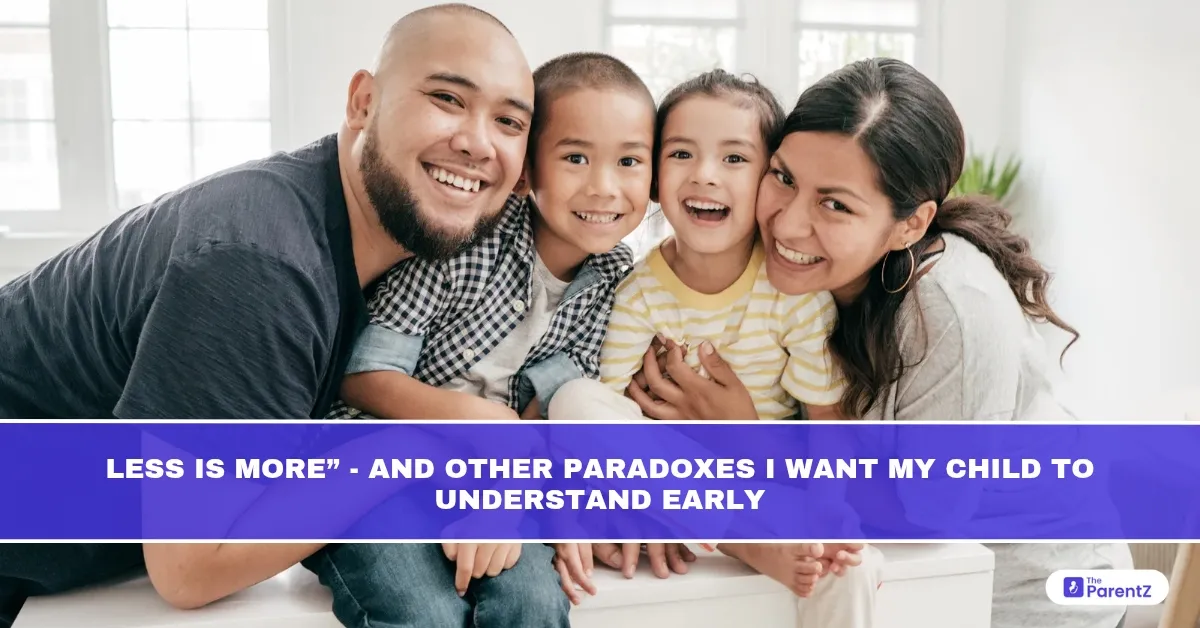Children often encounter statements that seem contradictory yet contain profound wisdom. "Less is more" might sound impossible to a young mind—how can having less of something actually give you more? Yet these apparent contradictions, known as paradoxes, represent some of life's most valuable lessons.
As parents, we often focus on teaching our children concrete skills and clear rules. However, helping our kids understand life's paradoxes might be one of the greatest gifts we can offer.
What Are Paradoxes and Why Do They Matter?
Paradoxes are situations that seem impossible because they contain contradictions, yet they're true. Teaching children about these contradictions early helps them develop critical thinking skills and prepares them for life's complexities. When young people understand that life isn't always straightforward, they become more adaptable, thoughtful, and resilient.
Now, let us explore some essential paradoxes every child should learn about!
The "Less Is More" Paradox
Many children want to join every available activity—sports, arts, clubs, and social events. However, when they're involved in too many things, they often end up exhausted, cranky, and not truly enjoying any of them.
This presents the perfect opportunity to teach the "less is more" paradox. By choosing just two or three activities they truly love, children have more energy, more fun, and actually improve faster because they aren't spread so thin. This concept helps young people make better choices about how they spend their time and energy.
The Talking Paradox
“We have two ears and one mouth so that we can listen twice as much as we speak,” said Epictetus. This paradox highlights the importance of listening over talking. Teaching kids this lesson can help them become better communicators and more empathetic friends. Listening carefully allows them to understand others’ perspectives and build stronger relationships.
The Effort Paradox
Children are often amazed when watching talented musicians or athletes who make difficult things look effortless. This provides a perfect teaching moment about the "effort paradox."
Great performances look easy precisely because so much hard work happened behind the scenes. The gymnast who seems to float through the air practiced thousands of times when no one was watching. The pianist who plays beautifully spent years practicing scales.
Understanding this paradox helps children develop patience with the learning process and prevents them from giving up when skills don't come instantly.
The Failure Paradox
One of the hardest but most important paradoxes for children to grasp is that failing more often can actually help them succeed.
When a child gives up after their first attempt at riding a bike doesn't go well, parents can explain how learning happens through mistakes. Each fall teaches something new about balance, steering, or pedaling. By embracing these small failures, children eventually succeed.
Young people who understand this paradox develop resilience and aren't afraid to try new things, knowing that mistakes are stepping stones rather than dead ends.
The Wisdom Paradox
As children progress through school, they often feel pressure to know all the answers. That's why teaching the wisdom paradox, beautifully expressed by Einstein, is valuable: "The more I learn, the more I realize how much I don't know."
Encouraging children to embrace curiosity rather than certainty helps them develop true wisdom. When they say "I don't know" and follow it with "but I'd like to find out," they're demonstrating an open mind receptive to new ideas and continuous learning.
The Speed Paradox
In today's fast-paced world, children are often rushed from one activity to the next. Yet some of life's most important lessons come from understanding that sometimes slowing down actually helps you speed up.
Whether it's taking time to properly learn multiplication tables before moving to more advanced math or practicing piano slowly before attempting to play at full speed, deliberate practice at a reduced pace often leads to faster progress in the long run.
The Technology Paradox
Today's children are more connected through technology than any previous generation, yet many experience profound loneliness. This "connectedness paradox" deserves open discussion with young people.
Having hundreds of social media connections isn't the same as having a few close friends you can really talk to. True connection often happens when devices are put away and people engage in face-to-face conversation.
The Fear Paradox
Often, the things we fear most are exactly what we need to face to grow stronger. For example, speaking in front of the class might terrify your child, but doing so builds confidence and communication skills. Encourage your child to confront their fears gradually—they’ll discover that bravery is built through action.
The Productivity Paradox
Working longer doesn’t always mean getting more done; in fact, overworking can lead to burnout and inefficiency. Teach your child that taking breaks while studying or working on projects can actually improve their focus and results. This lesson helps them value balance and self-care.
Why Paradoxes Are Important for Kids
Paradoxes challenge conventional thinking and encourage kids to see situations from different angles. They teach critical thinking skills by showing that not everything is black-and-white—sometimes, two seemingly opposite ideas can both be true.
By introducing these paradoxes early:
- Kids learn stability in the face of challenges.
- They develop problem-solving abilities by questioning assumptions.
- They gain wisdom about life’s complexities in a way that builds empathy and creativity.
Conclusion
Paradoxes may seem puzzling at first glance, but they hold timeless wisdom that can guide children through life’s ups and downs. By teaching your child these lessons early on, you’re equipping them with tools for critical thinking, emotional resilience, and lifelong learning—all while fostering their sense of wonder about the world around them!






Be the first one to comment on this story.